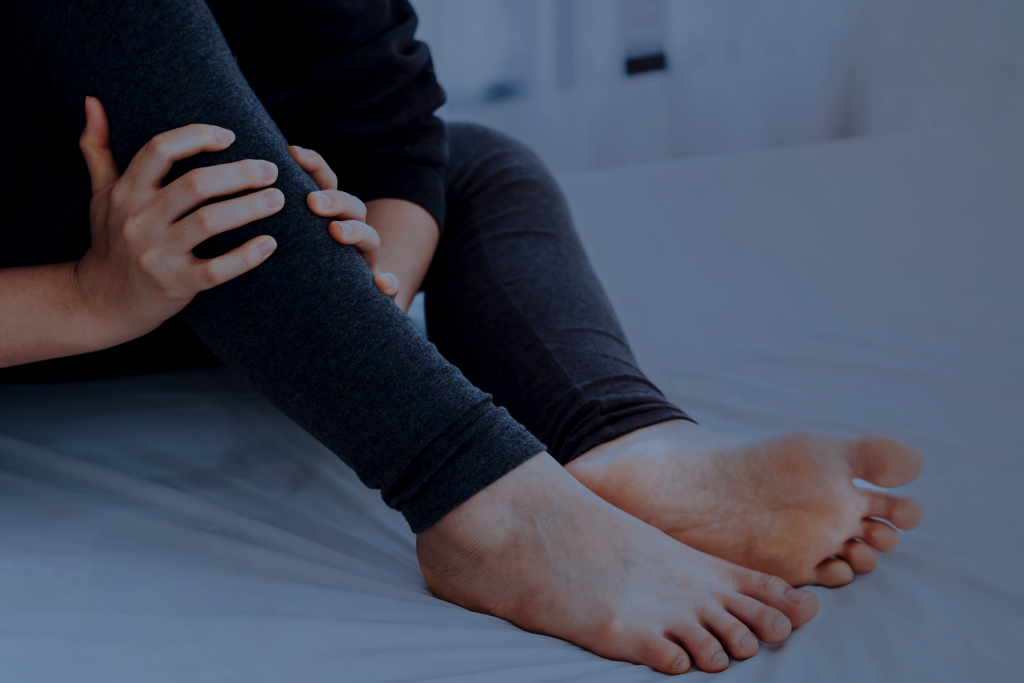Nighttime leg cramps, or nocturnal leg cramps, are painful involuntary muscle contractions that often disrupt sleep. While these cramps commonly affect the calf muscles, they can also occur in the thighs or feet. Understanding their causes and implementing preventative strategies can help alleviate discomfort and improve your sleep quality.
Common Causes of Nighttime Leg Cramps
Dehydration
Insufficient hydration leads to an electrolyte imbalance, particularly in potassium, magnesium, and calcium, which are essential for proper muscle function.
Electrolyte Imbalance
Low levels of electrolytes impair the muscles’ ability to contract and relax, resulting in cramps.

Poor Circulation
Prolonged sitting or lying in one position can restrict blood flow to the muscles, triggering cramps.
Overexertion or Muscle Fatigue
Physical activity that overworks muscles, especially if they aren’t accustomed to the effort, can lead to cramping during periods of rest, such as sleep.
Nerve Compression
Conditions like sciatica or spinal nerve compression can irritate nerves, causing involuntary muscle contractions.
Pregnancy
Hormonal changes, increased pressure on nerves and blood vessels, and shifts in calcium and magnesium levels make pregnant women more prone to cramps, especially in later trimesters.
Medications
Diuretics, statins, and certain blood pressure medications may lead to cramps by disrupting fluid or electrolyte balance.
Age
Older adults often experience leg cramps due to muscle mass loss, reduced circulation, or side effects from medications.
How to Prevent and Relieve Nighttime Leg Cramps
1. Stay Hydrated
Drink water consistently throughout the day to maintain hydration and balance electrolytes.
2. Stretch and Exercise Regularly
Stretch your calf and leg muscles before bedtime.
- Simple Stretch Example: Stand facing a wall, place your hands on it for support, and stretch one leg back while keeping the other bent. Hold for 15–30 seconds and switch legs.
3. Use Heat or Cold Therapy
Apply a heating pad or warm towel to the affected area to relax tight muscles.
Use an ice pack to reduce inflammation, especially if the cramp is injury-related.
4. Massage and Gentle Movement
Gently massage the cramped muscle or walk around to improve circulation and release tension.
5. Maintain Electrolyte Balance
Incorporate foods rich in potassium, magnesium, and calcium into your diet. Examples include:
- Potassium: Bananas, oranges, and sweet potatoes.
- Magnesium: Leafy greens, nuts, and seeds.
- Calcium: Dairy products, fortified plant milk, and almonds.
- Consider taking electrolyte supplements if dietary changes aren’t sufficient.
6. Evaluate Your Medications
Consult with a healthcare provider to determine if any medications are contributing to leg cramps. Adjustments or alternatives might be available.
7. Optimize Your Sleeping Posture
Avoid pointing your feet downward while sleeping, as this can strain the calf muscles.
Try sleeping with a pillow under your knees or elevating your feet slightly.
8. Wear Proper Footwear
Invest in shoes with good arch support to reduce muscle strain during the day, especially if you have flat feet.
9. Soak in a Magnesium-Rich Bath
Take a warm bath with Epsom salts before bed to relax muscles and alleviate cramps.
10. Consider a Nighttime Supplement
Some individuals find relief by taking magnesium before bed. However, always consult a healthcare provider before starting new supplements.

When to Seek Medical Attention
If nighttime leg cramps persist despite implementing these strategies, or if they are accompanied by other symptoms such as swelling, redness, or numbness, consult a healthcare provider. Persistent cramps may indicate an underlying condition such as peripheral artery disease, diabetes, or a neurological issue.
Final Thoughts
By understanding the triggers of nocturnal leg cramps and adopting these preventative measures, you can reduce their frequency and severity. Proper hydration, stretching, and attention to overall health are key to keeping your muscles relaxed and ensuring a restful night’s sleep. Don’t let leg cramps disrupt your life—take proactive steps to address the issue and enjoy more peaceful nights.

















